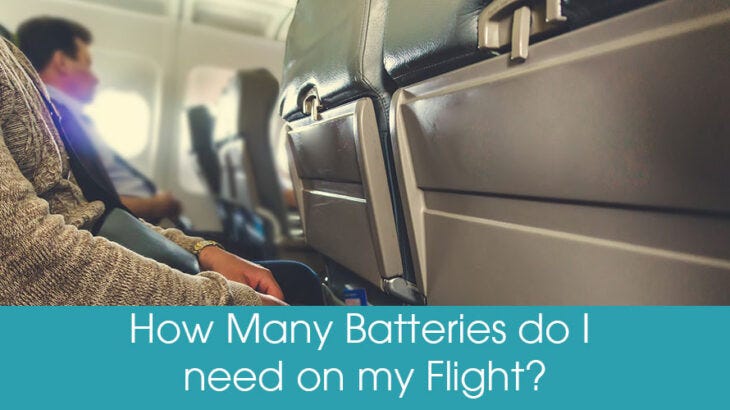Over the past several months, the NHOPA Executive Office has received many inquiries concerning the number of POC batteries that are needed for specific airline travel. For example, one individual was trying to schedule a flight from Fairbanks, Alaska to Atlanta, Georgia to visit close friends. Another individual was planning a business trip from Portland, Oregon to New York City.
From our research on POC batteries, we found that the general rule of thumb is to plan for one and one half -times the length of the flight including layovers. For example, if you book a five hour non-stop flight you will need approximately 7.5 hours of batteries.
For further clarification, the following is an excerpt from the DOT final rule that explains the rules regarding POC batteries
Federal Register Vol. 73, No. 93, May 13, 2008, pages 27633-27634. Nondiscrimination on the Basis of Disability in Air Trafel; Final Rule
The Department has decided to allow a carrier to require an individual who uses a ventilator, respirator, CPAP machine or FAA-approved POC to bring an adequate number of fully charged batteries onboard to operate the device for not less than 150% of the expected maximum flight duration. The appropriate number of batteries should be calculated using the manufacturer’s estimate of the hours of battery life while the device is in use and the information provided in the physician’s statement (e.g., flow rate for POCs). The expected maximum flight duration is defined as the carrier’s best estimate of the total duration of the flight from departure gate to arrival gate, including taxi time to and from the terminals, based on the scheduled flight time and factors such as
- wind and other weather conditions forecast;
- anticipated traffic delays;
- one instrument approach and possible missed approach at destination;
- (d) any other conditions that may delay arrival of the aircraft at the destination gate.
This rule also makes it clear that the carrier may deny boarding, on the basis of safety, to an individual who does not carry the number of fully charged batteries prescribed in the rule or an individual who does not properly package the extra batteries needed to power his/her device.
However, a carrier may not deny boarding due to an inadequate number of batteries unless the carrier can provide information from a reliable source demonstrating that the number of batteries that the passenger has supplied will not provide adequate power for 150% of the expected maximum flight duration based on the battery life indicated in the manufacturer’s specification when the device is operating at the flow rate specified in the physician’s statement.
It is also worth noting that the requirement to bring an adequate number of batteries to continuously operate the device for up to 150% of the expected maximum flight duration does not apply in circumstances where the passenger will be using an FAA approved POC while boarding or disembarking from the aircraft and will not be relying on the POC during flight because the passenger has contracted for carrier-supplied oxygen. In instances where the carrier denies boarding to an individual, the carrier must provide the individual a written statement of the reason for the refusal to provide transportation within 10 days of the incident.”
And if needed the TSA Cares Toll Free Helpline is available for Travelers with Disabilities and Medical Needs. The Transportation Security Administration (TSA) has a helpline number designated to assist travelers with disabilities and medical conditions prior to arriving at the airport. Travelers may call TSA Cares toll free at 1-855-787-2227 prior to traveling with questions about screening policies, procedures and what is expected at the security checkpoint.
More information about TSA procedures and guidelines contact us at 877.774.9271
Scott joined American Medical Sales and Rentals in 2008 as a Web Manager and Content Writer. He is a writer and designer. He is extensively trained on oxygen therapy products from leading manufacturers such as Inogen, Respironics, Chart, Invacare, ResMed and more.
Scott works closely with respiratory therapists and oxygen specialists to educate the community about oxygen therapy products, COPD, asthma and lung diseases. He writes weekly columns and is passionate about educating the community on oxygen therapy and respiratory issues.





